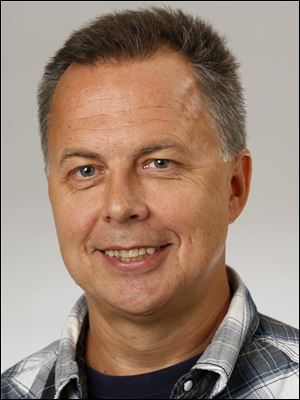
COMMENTARY
G-7’s action too weak to deter Putin
Putin is bent on undermining the Ukrainian government by waging a covert war
6/15/2014
Sigov.
Europe’s prospects for peace have deteriorated after U.S. partners in the G-7 failed at the group’s summit in Brussels earlier this month to rally behind U.S. efforts to isolate Russia.
The world’s seven industrialized nations have rightfully demanded that Russia — meaning Russian President Vladimir Putin — recognize newly, democratically elected Ukrainian President Petro Poroshenko, stop armed groups from crossing the border from Russia into Ukraine, and stop supporting insurgents in eastern Ukraine.
Russia responded by sneaking a few tanks to insurgents.
The problem is that G-7’s demands do not come with effective threats in case Mr. Putin fails to comply. To be effective, such threats have to target his political survival — which would be jeopardized only if the government gets so cash-strapped that the people resort to civil disobedience. But this is a too distant prospect now, since the country’s economy is fairly stable and his approval rating is 80 percent.
Such threats failed to materialize.
The leaders of the free world — mired in their own political problems — stopped short of threatening so-called sectoral sanctions that would impose an embargo on Russia’s financial institutions as well as on its energy, defense, and other high-tech industries. As for threatening further sanctions against individuals and companies close to Mr. Putin, such measures can certainly help chip off his wealth abroad but fall short of threatening his leadership of Russia, which he effectively owns.
They also did not threaten to move NATO bases closer to Russia’s borders, which would have been a strong warning to the security-obsessed autocrat.
The ex-KGB career officer is bent on undermining the Ukrainian government by waging a covert war in eastern Ukraine. His survival as Russia’s de-facto dictator and arguably the world’s richest person hinges upon the ability to sustain his spectacularly successful propaganda that feeds on war casualties he casts as “atrocities committed by Ukraine’s fascists and their Western sponsors,” sustaining his image as Russia’s savior.
So chances are Mr. Putin will continue his policy of subterfuge, which has claimed nearly 300 civilian lives in Ukraine.
Despite Western demands, he will also continue his propaganda campaign to incite anti-Ukrainian and anti-Western hysteria in Russia, and continue to use his secret services to sponsor the insurgency in eastern Ukraine that has been infiltrated by Russian-speaking, Russian-armed fighters. About 71 percent of people in Russia share a “negative” attitude toward the United States, according to a recent poll by the Levada Center, Russia’s leading independent polling agency.
Mr. Putin will continue to use Ukraine’s dependence on Russian natural gas to tighten the noose. He has used inflated gas prices, threats of pre-charging, and demands of immediate payment of an about $2-billion natural gas bill under a threat of a supply cutoff tomorrow — to pressure the Poroshenko government to federalize Ukraine. Mr. Putin needs that federalization so he can bribe and corrupt future regional leaders of Ukraine to further destabilize it.
Unfortunately, the political and economic situation in Europe remains permissive to Mr. Putin’s ambitions.
The biggest problems include Germany, which depends on Russian natural gas for about a third of its needs, the U.K.’s financial system, which enjoys an untold flow of cash as it flees Russia, and France, which has been unwilling to upset Mr. Putin and risk disrupting lucrative weapons exports to Russia.
To keep the status quo, all Mr. Putin has to do is refrain from anything that would look unpalatable on TV — such as massive troop movement across the border or clearly marked Russian military units engaging in warfare.
This is bad news for Russia’s former vassal states that used to be part of the Soviet Union, including such NATO members as Latvia, Lithuania, and Estonia — with their sizable Russian minorities Mr. Putin claims to “protect.”
Wishful thinking and the overall permissiveness that prevails in the West in regard to Russia ever since it shed its communist ideology may lead Mr. Putin to believe that he can expand his creeping, deniable aggression in the face of the indecisiveness of the West, which fears triggering World War III.
Mike Sigov, a former Russian journalist in Moscow, is a U.S. citizen and a staff writer for The Blade.
Contact Mike Sigov at: sigov@theblade.com, 419-724-6089, or on Twitter @mikesigovblade.